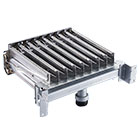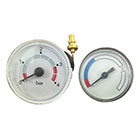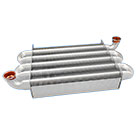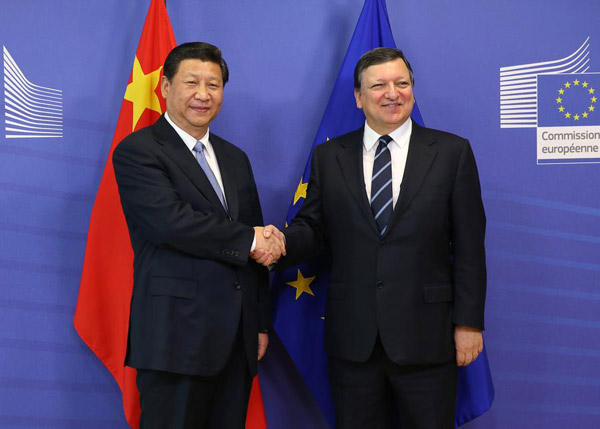Products List
We should join hands, Xi tells EU
China and the European Union should be partners for growth, offering each other opportunities and speeding up completion of an investment treaty, President Xi Jinping told European Council President Herman Van Rompuy on Monday.
In the first visit to EU headquarters by a Chinese president, Xi told the bloc's top official that China expects Europe to expand high-tech exports, and that the two sides should start a feasibility study for a free trade pact as soon as possible.
Xi, on the last leg of his first official tour of Europe, met with Van Rompuy, European Parliament chief Martin Schulz and European Commission President Jose Manuel Barroso.
|
|
|
Chinese President Xi Jinping (L) meets with Jose Manuel Barroso, president of the European Commission, in Brussels, Belgium, March 31, 2014. |
Xi said China firmly supports European integration and has committed itself to expanding and deepening a comprehensive strategic partnership with the EU.
He proposed that the two sides take the lead in following a course of peaceful development by intensifying consultations and coordination on international and regional affairs to push for the political settlement of "hot" issues.
As reform in China and the EU has entered "deep-water" zones, the two sides should share experience and step up cooperation on such reform priorities as the macroeconomy, social governance, public policies, rural development, employment and environmental protection.
Van Rompuy said the Chinese president's presence at the EU headquarters is testimony that the EU-China comprehensive strategic partnership is on a firm footing.
Echoing Xi, Van Rompuy said the EU is willing to speed up negotiations for a Europe-China investment agreement and for a free trade pact, and to cooperate with China in areas including urbanization, sustainable development and coping with climate change.
The EU places emphasis on the new opportunities unleashed in China's reform and opening-up and hopes to broaden cooperation with the nation, he said.
In an earlier interview with Xinhua News Agency, Van Rompuy said, "There are many common features in Europe's growth and job strategy and China's 12th Five-Year Plan — how to provide first class educational opportunities for our young people, how to encourage research and innovation, how to sustain a clean environment, reduce poverty, ensure effective public service and cut red tape for business.
"In all these areas, we can learn from each other and exchange views on how to achieve our priorities," he said.
Chi Fulin, president of the China Institute for Reform and Development, said, "Xi's visit to EU headquarters is of historic meaning, and the consensus achieved between Xi and Van Rompuy is also of great significance," — a reference to the fact that China and the EU have agreed to deepen partnerships in peace, growth, reform and civilization.
Chi is among a group of Chinese experts attending a high-level seminar on China's reform and its implications to Europe and the world, hosted by the College of Europe on Tuesday and Wednesday, where Xi is scheduled to give a speech on Tuesday to wrap up his European tour.
In a meeting with Barroso, Xi said he hopes Europe will keep markets open, exercise caution over the use of trade remedy measures and bring trade friction under control.
Xi said he hopes the two sides will conduct equal dialogue and friendly consultations to "put out the sparks of trade frictions and let the flames of prosperous development rage".
Barroso said the EU, in line with the China-EU 2020 Strategic Agenda for Cooperation, hopes the two sides will upgrade trade and investment levels as they negotiate the investment agreement and free trade pact.
Both sides will properly handle trade friction in wireless communications equipment and other areas, he said.
In view of last year's solar panel dispute between the two sides, Feng Zhongping, vice-president of the China Institutes of Contemporary International Relations, said the "lose-lose" game of trade friction will lead to China and the EU consulting each other on setting up an early warning mechanism to avoid serious damage.
"In terms of reducing future trade disputes, the negotiation and signing of the China-EU Investment Agreement offers another perspective," Feng said.
The EU is China's largest trade partner, while China is the EU's second largest. In 2013, bilateral trade reached $559 billion.
Zhou Hong, director of the Institute of European Studies at the Chinese Academy of Social Sciences, said: "European integration offers a new perspective for China. The two sides can find common language on innovations in governance mechanisms and institutions.
"On one hand, the integration process has effectively prevented vicious competition and brought peace among member states," she said.
"On the other hand, the integration has led to prosperity because of the merger of many small state-level markets into one vast and well-functioning community."





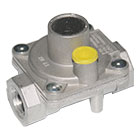
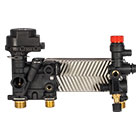



-f.jpg)
